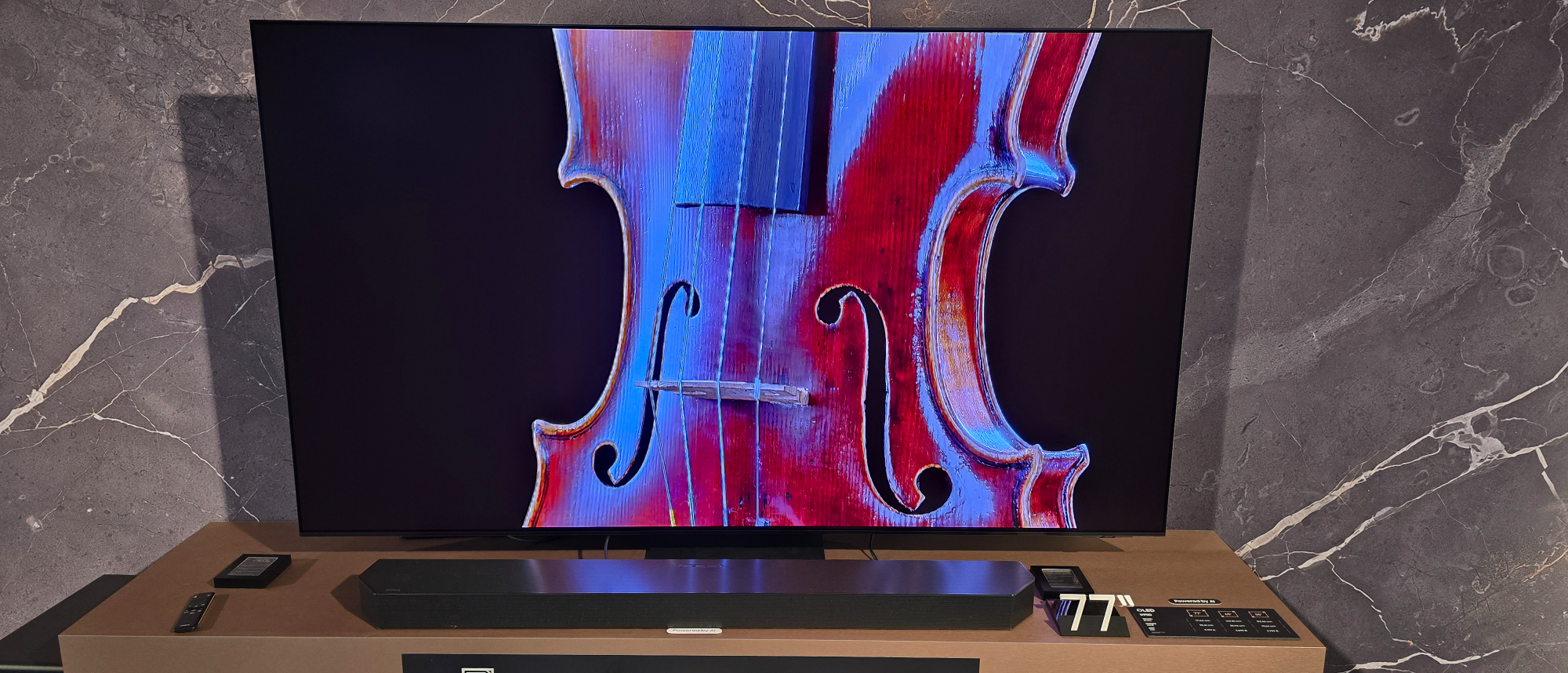
Once an emerging and exciting screen technology, QD-OLED has now become an expected technology on Samsung's flagship-level OLED TVs. Does that mean that it's lost the glossy sheen we once associated with the premium screen tech? In some ways, yes, but not in the way you'd expect. While we're certainly still excited by the brightness-boosting aspect of these OLED panels, Samsung is tackling the issue of screen glare head-on this year.
As QD-OLED continues to progress, so does its LG Display-derived counterpart. We've just spent some brief time with the LG G4, Panasonic Z95A and Philips OLED909, all of which will be released later this year and make use of MLA OLED panels. So how does the Samsung S95D stack up in this regard?
While we'll need to wait until it lands in our AV testing room to answer that question confidently, we can certainly share a few first impressions thanks to a brief sighting of the set at the World of Samsung event in Frankfurt, Germany. Here's what we think so far.
Pricing and availability
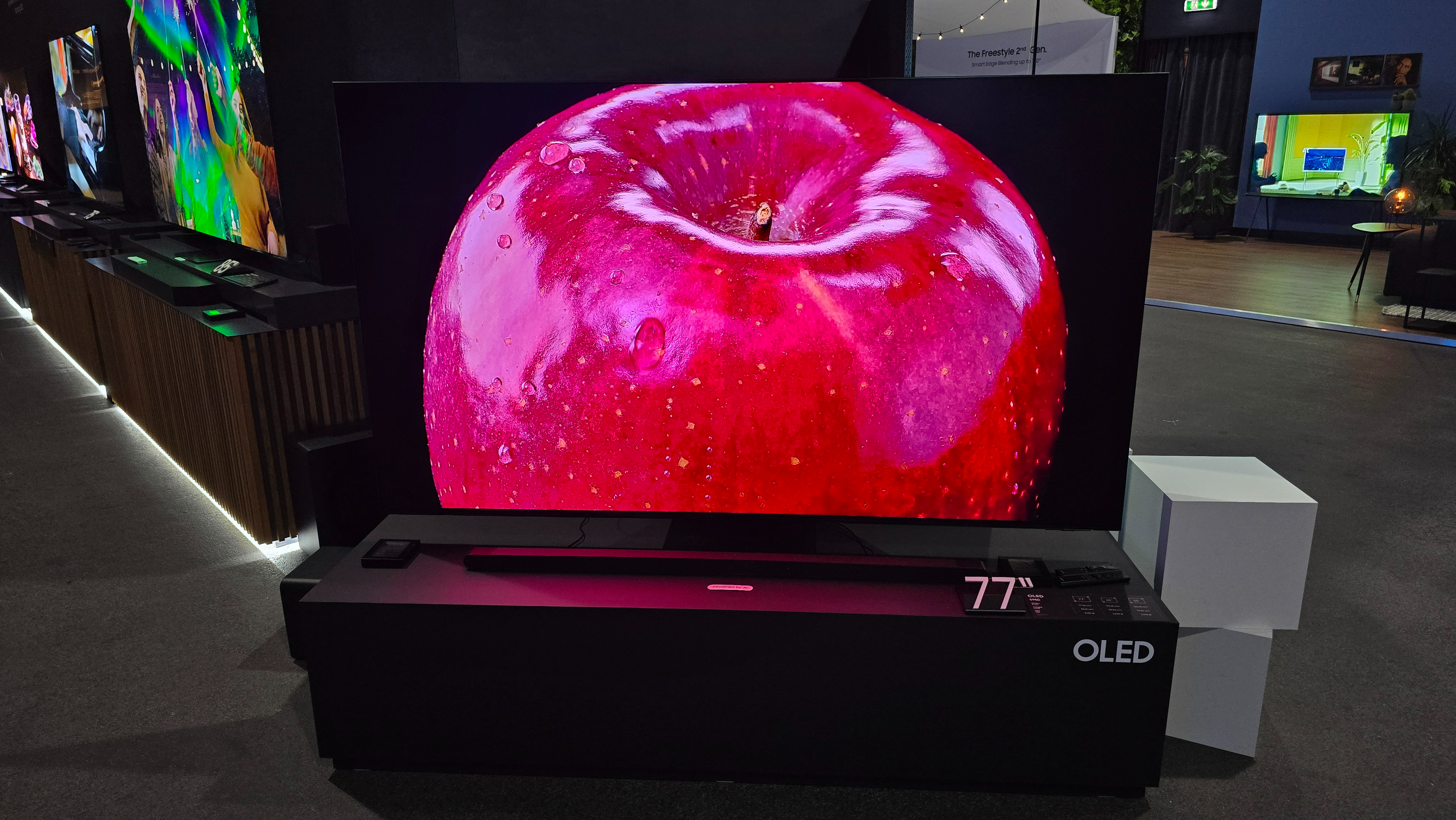
We'll keep this short and sweet. Samsung is yet to reveal how much the S95D costs worldwide and when it'll be available to purchase. However, we do have some European pricing to go off, as well as the pricing for last year's S95C.
Samsung has revealed that the 55-inch model will cost €2799, the 65-inch is €3699, and the 77-inch will retail for €5199. That is a price jump on all accounts from last year, as the S95C started at €2499, while the 65-inch and 77-inch launched at €3,299 and €4,799 respectively.
We haven't had confirmation on whether those price increases will reflect in the UK, USA and Australia, however, we certainly wouldn't be surprised if that is the case. We can look at the S95C's launch price in those markets for context.
- Samsung QE55S95C: £2699 / $2499 / AU$3999
- Samsung QE65S95C: £3599 / $3299 / AU$4999
- Samsung QE77S95C: £5099 / $4499 / AU$7999
Samsung tends to aim for Spring launches (based on previous releases), so we could expect to see the S95D appear in shops towards April or May, but that is of course subject to change as per Samsung's prerogative.
Design
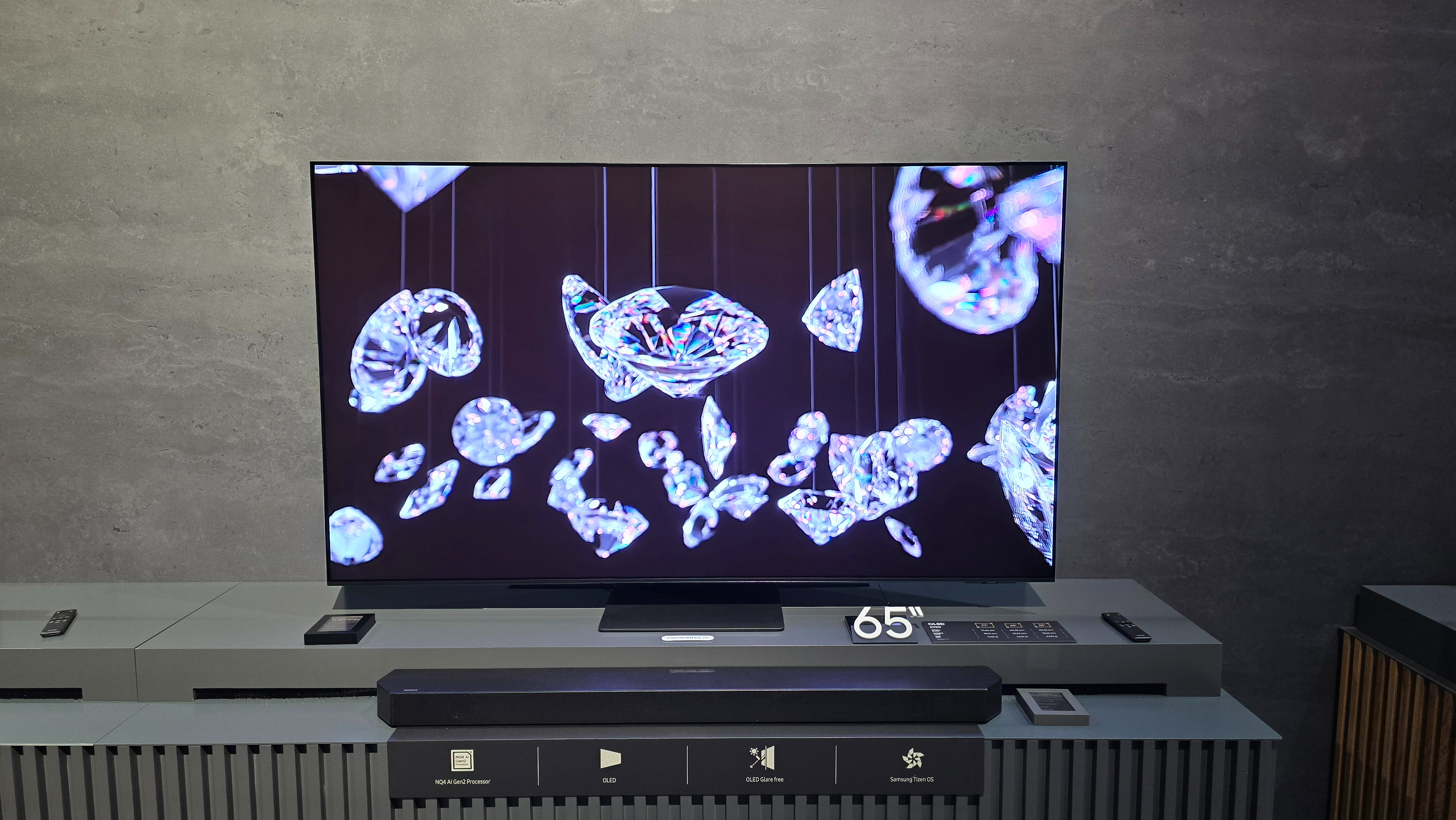
Samsung remains consistent with its 2023 design language; which is a roundabout way of saying that the S95D looks nearly identical to the S95C. We've seen the S95D in two sizes now (65- and 77-inches), and it remains uniform throughout with a centralised pedestal-style base. This makes it a dream for those who don't want to buy a bigger media unit every time they upgrade their TV, as this model should sit comfortably on practically any sized entertainment unit (within reason of course).
The side profile is spectacularly slender, with all the chunky electronic components and ports relegated to the familiar One Connect box that keeps cable clutter away from the main attraction.
Features
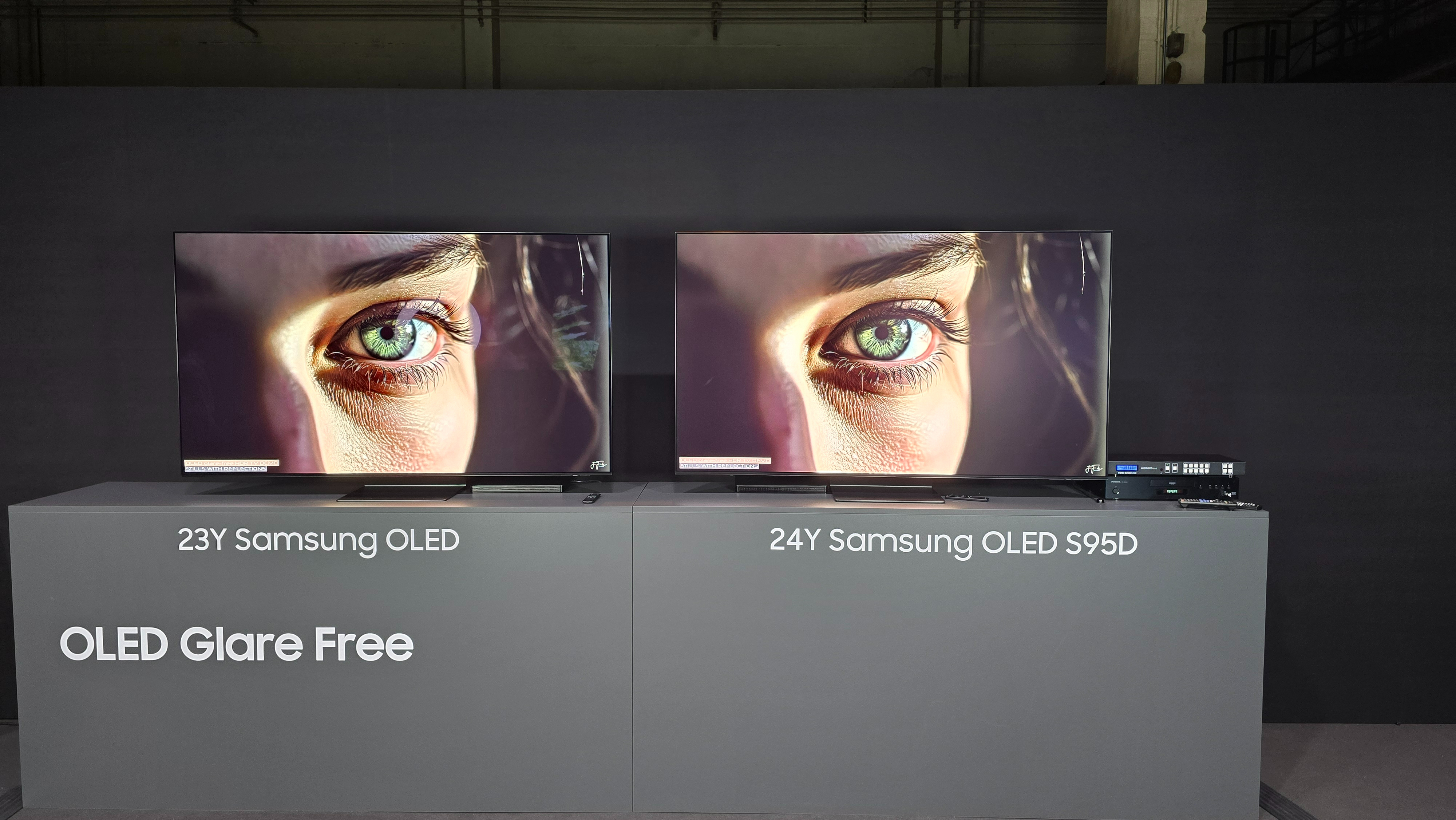
As we alluded to earlier, Samsung is attempting to tackle the issue of screen glare this year, with a feature called "OLED Glare free". While glare-free might be a generous description, it has done quite a good job of reducing glare significantly on this new model. In the former steelworks factory where Samsung held its event, the S95D seemed unfazed by the abundance of ambient light. Shining a smartphone torch on the display is perhaps an extreme test, but we can see the feature in action as it dissipates and softens the effect of direct light, making it much easier to ignore; even on a predominately black background. The real question is: how does this affect picture quality?
Not only does this third generation QD-OLED panel combat glare, it also ups the brightness once again. The S95D is supposedly 20 per cent brighter than its predecessor, which corresponds with the CES rumours that this year's QD-OLED panels will be able to reach 3000 nits. The likelihood that Samsung will push its panels that hard is slim, but it's an interesting feature nonetheless. LG Display has also said its MLA OLED panels will be capable of hitting 3000 nits this year too, so it looks like QD OLED and MLA could be close rivals in the brightness department once again.
Elsewhere, the S95D features the expected slew of Samsung gaming features. It's equipped with four full bandwidth HDMI 2.1, capable of 4K/120Hz gaming on consoles or up to 144Hz on PCs; a trend we're seeing on plenty of TVs this year. You'll also find VRR and ALLM on board, with Samsung's suite of cloud gaming applications built-in if you don't fancy hooking up a console to your TV.
Speaking of applications, now would be a good time to talk about Tizen OS. Samsung's TV operating system returns with a hefty redesign, taking on a full-screen styling that features a greater selection of user-generated content suggestions. Elsewhere there are new accessibility features for those with impaired vision, as well as a dialogue-boosting sound setting and new subtitle settings.
Samsung attributes many of these new features to AI, two letters that are likely to be divisive to many. The Korean company has crammed artificial intelligence into everything from its Galaxy S24 Ultra phone to its ovens, and TVs have not been spared. Truthfully, it looks like it's been put to good use with these new features, although only time will tell how it progresses.
As if AI wasn't polarising enough, we move onto an even more controversial initialism: HDR. Samsung is staunchly opposed to including Dolby Vision on its TVs (despite us pestering them to concede), so the S95D sticks with the HDR10+ standard instead, accompanied by HDR10 and HLG. Samsung hasn't turned its back on Dolby completely though, as there is support for Dolby Atmos audio on the S95D.
Picture

A looping set of demo videos is all we have to go off here, so as you can well imagine these are not our conclusive thoughts on the TV. Those will come when we've set the TV up in our dedicated testing room and used our reference material to properly test the S95D. That being said, there's no harm in gathering our first impressions.
It's tricky to pin down exactly what to call the screen, as calling it a matte display feels like we're doing it a disservice. While matte displays can dull down picture performance, the S95D doesn't fall victim to this in our brief time with it, as it remains as engaging and punchy as we'd expect based on our experiences with Samsung's previous OLED TVs.
An abstract scene of melting wax flowers and a handbag that's cut open to reveal that it's secretly a cake reveals striking, rich colours, while the black background is suitably dark. An outstretched arm that turns on a tap that spews out flames looks well-defined, with some skin texture to note, but considering the nature of this footage it's hard to tell what that individual's hand should actually look like.
The eruption of flames does hint at the S95D's capabilities when it comes to brightness though, and so far it looks impressive. However, when placed side by side with the S95C, the brightness boost isn't exactly a night and day difference. A short clip from John Wick: Chapter 4 shows that the TV is slightly more dazzling in the brightest parts, but it's not a night and day difference.
Sound
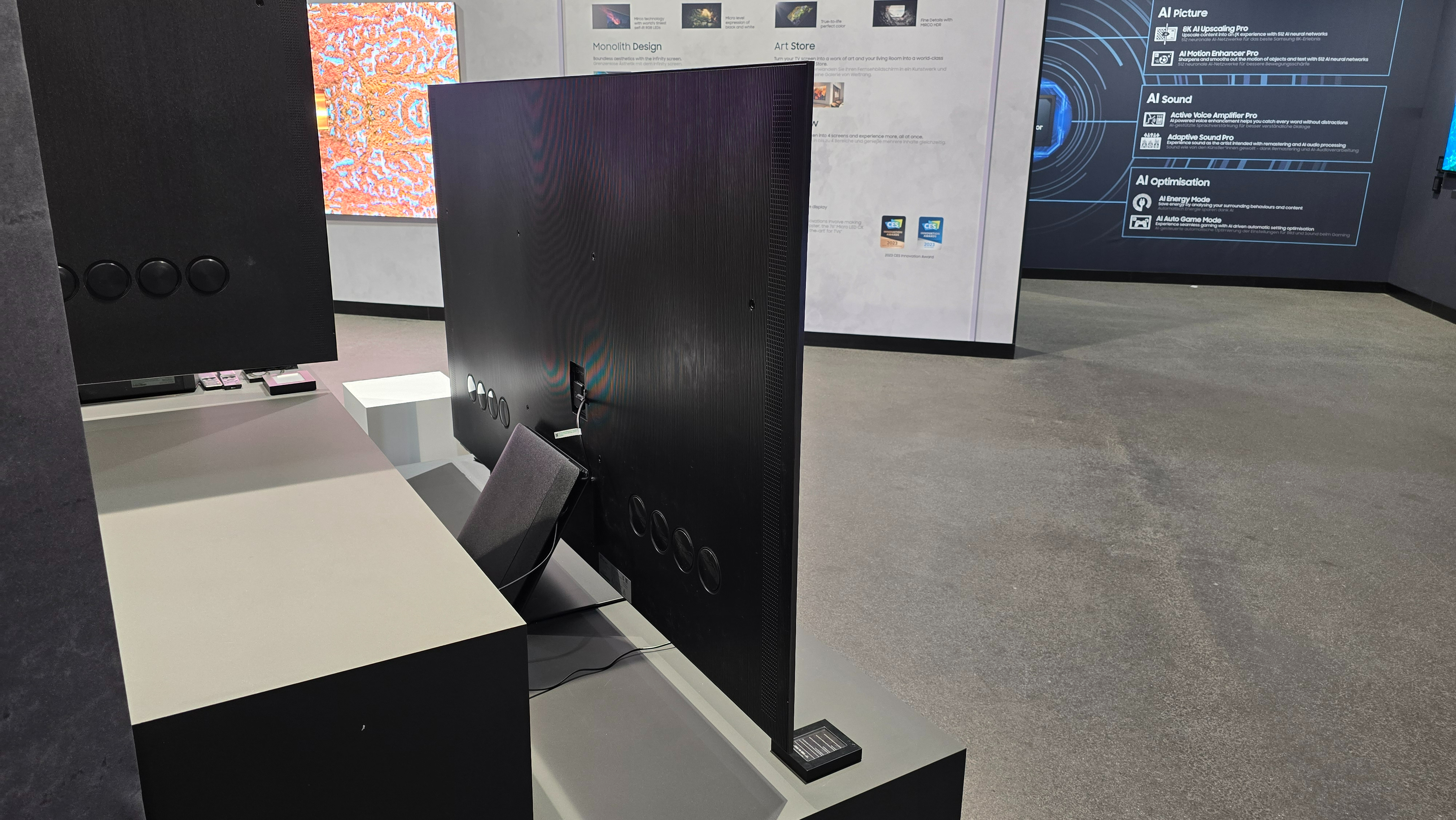
Due to the nature of the event we didn't get a chance to listen to the S95D's built-in sound system. We presume it's using the same 70W 4.2.2 sound system as its predecessor which we weren't particularly fond of last year, but we're well aware that Samsung could have made some software and/or hardware tweaks in order to improve sound performance on this year's model.
Early verdict
We're hesitant to call the S95D an evolutionary step over the S95C it's replacing, but the tweaks that have been made seem meaningful from our first impressions. The anti-glare feature could be a saving grace for those who don't have a pitch black cinema room on hand to set their TV up in, as it should tackle pesky ambient light from windows and indoor lighting alike. We have no qualms regarding its feature set either, which seems like another solid achievement from Samsung.
We do hope that Samsung has paid attention to the finer details this year, however, as we criticised the S95C's oversight when it came to subtlety last year. While we're holding out judgement until we have a review sample of our own, we're certainly looking forward to seeing what the S95D has to offer.
MORE:
Read our full Samsung QN900D 8K TV hands-on review
As well as our full Samsung S95C review
And our picks for the best OLED TV







